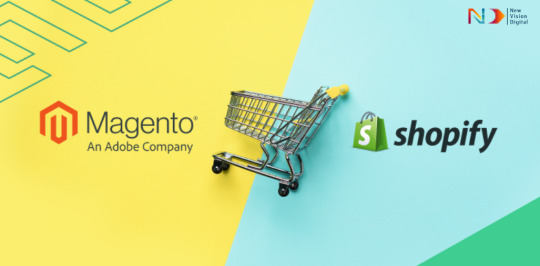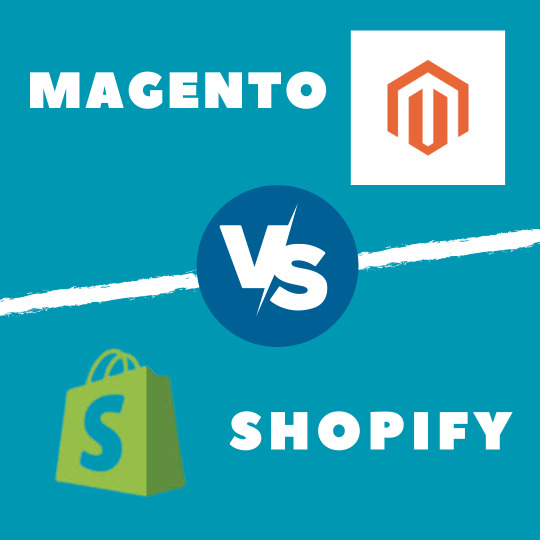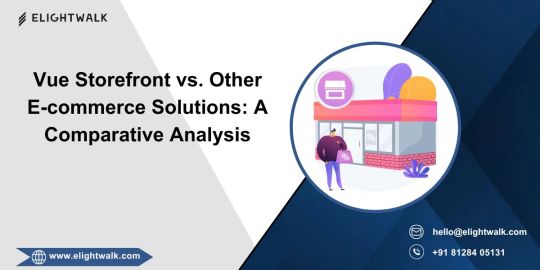#shopify vs magento
Explore tagged Tumblr posts
Text
Unleash the potential of BigCommerce B2B for your online store. Empower your business-to-business e-commerce operations with the robust capabilities of BigCommerce. From personalized pricing and account management to streamlined order processes, this solution offers the tools you need to create a seamless and efficient B2B shopping experience. Discover how BigCommerce B2B can transform your online store into a powerful platform for business customers.
#magento developer#magento developers#magento development services#magento ecommerce#shopify vs magento#magento vs shopify#magento integrations#ecommerce website design#magento 1 to magento 2 migration#magento 1 vs magento 2#migrate magento 1 to magento 2#magento 1 to 2 migration
1 note
·
View note
Text
Compare WooCommerce, Shopify, and Magento to find the best platform for your online store. Discover their features, pros, cons, and which one fits your business needs.
#woocommerce vs shopify#magento vs shopify vs woocommerce#ecommerce website#ecommerce business#Ecommerce Website Development#Website Development#Online Store Development#WooCommerce#Shopify#Magento
0 notes
Text
Magento vs Shopify: Which Ecommerce Platform is Right for Your Business?
When comparing Magento vs Shopify for ecommerce, each platform offers distinct advantages. Magento (Adobe Commerce) provides extensive customization, making it ideal for large businesses with complex needs. Its open-source nature allows developers to build highly tailored solutions. On the other hand, Shopify is known for its user-friendly interface and quick setup, perfect for small to medium businesses wanting to launch fast. Shopify also includes built-in hosting and security, making it easier for non-technical users. Ultimately, Magento offers flexibility and scalability, while Shopify excels in simplicity and ease of use. Choose based on your business’s unique needs!
0 notes
Text
Magento vs Shopify Development: Choosing the Right Fit for Your Business

The world of eCommerce is booming, and with it comes the question of choosing the right platform for your online store. Two giants stand out: Magento and Shopify. But which one is better for your business? It depends on your specific needs and goals.
For Scalability and Customisation: Magento development shines if you envision a large-scale online empire. Its highly customisable platform offers extensive control over design, functionality, and integrations. This flexibility with expertise from Magento development services in Florida allows you to create a unique shopping experience tailored to your brand. Magento is ideal for businesses with complex product catalogues or a strong desire for custom features. However, this power comes with a price tag. Magento requires significant development expertise and ongoing maintenance, making it less suitable for startups or budget-conscious businesses.
For Ease of Use and Speed: Shopify development offers a user-friendly approach. Its intuitive interface and drag-and-drop functionality make setting up and managing your store a breeze. With a vast app store offering pre-built solutions for most needs, extensive customisation is still possible without extensive coding knowledge. Shopify also handles hosting and security, allowing you to focus on running your business. This ease of use comes with limitations in customisation compared to Magento. However, the expertise of Shopify web developers in Miami and Shopify's speed and affordability make it an excellent choice for SMBs or those seeking a quick launch.
Conclusion
There's no one-size-fits-all answer. Consider your technical expertise, budget, and future growth plans. Magento is the way to go if you crave ultimate control and scalability. Shopify might be better if you prioritise ease of use, speed, and lower initial investment. Ultimately, the best platform is the one that empowers your business to build an online store that perfectly reflects your vision and drives success.
0 notes
Text
Magento vs Shopify: Which E-commerce Platform is Right for Your Business?
Introduction Choosing the right e-commerce platform is crucial for the success of your online business. With so many options out there, it can be hard to decide which one to go with. Two of the biggest names in the game are Magento and Shopify. But which one is right for you? Let’s dive into a detailed comparison to help you decide. Overview of Magento Magento is an open-source e-commerce…

View On WordPress
0 notes
Text
Vue Storefront vs. Other E-commerce Solutions: A Comparative Analysis

The e-commerce market has become increasingly competitive, with many businesses turning to e-commerce solutions to keep up with their competitors. A comparative analysis between Vue Storefront and other e-commerce solutions involves evaluating various factors such as architecture, flexibility, scalability, performance, community support, and ease of use. With so many options, selecting your business's ideal solution can be challenging.
In this blog post, we'll look at Vue Storefront, one of the most popular e-commerce solutions on the market, and compare it to other e-commerce solutions to see which one is best suited for your business.
Vue Storefront is a modern, open-source e-commerce platform that helps businesses set up online stores quickly and securely. But how does it compare to other e-commerce solutions? Here's a comparative analysis of the features and benefits of Vue Storefront versus other e-commerce solutions.
Architecture:
Vue Storefront: Vue Storefront is a Progressive Web App (PWA) storefront built with Vue.js. It follows an API-driven approach, making it platform-agnostic and allowing integration with various backend e-commerce systems.
Magento PWA (PWA Studio): Magento PWA Studio enables the development of a PWA storefront using React.js. It works with the Magento backend, offering a flexible and modular architecture.
Shopify with Storefront API allows developers to build custom PWAs using their preferred technologies. It decouples the front end from the backend, providing flexibility.
Flexibility and Customization:
Vue Storefront: Known for its high flexibility, it empowers developers to create highly customizable and feature-rich front-end experiences. It supports various backend integrations.
Magento PWA (PWA Studio): Magento PWA Studio provides flexibility and customization options, allowing developers to extend and modify the storefront based on specific business requirements.
Shopify with Storefront API: While Shopify allows customization using the Storefront API, it may have some limitations compared to entirely headless solutions like Vue Storefront.
Scalability:
Vue Storefront: Vue Storefront is designed for scalability, supporting large product catalogues and high traffic. It employs caching strategies and optimized data fetching to enhance performance.
Magento PWA (PWA Studio): Magento is known for its scalability, and PWA Studio extends this scalability to the front end. However, performance optimization may require additional considerations.
Shopify with Storefront API: Shopify is highly scalable, and the Storefront API supports efficient data fetching and customization for improved performance.
Community and Support:
Vue Storefront: Vue Storefront has an active and growing open-source community. Regular updates, documentation, and support are available through forums and GitHub.
Magento PWA (PWA Studio): Magento has a large and active community, and PWA Studio is part of Magento's commitment to modernizing its front-end architecture.
Shopify with Storefront API: Shopify has a large user community, and the Storefront API is part of Shopify's commitment to providing headless commerce solutions.
Ease of Use:
Vue Storefront: Vue Storefront is known for its developer-friendly environment, but it might have a steeper learning curve for those less familiar with Vue.js.
Magento PWA (PWA Studio): Magento PWA Studio provides a modular architecture for developers but might require some learning for those new to Magento and React.js.
Shopify with Storefront API: with its hosted nature, Shopify can be more user-friendly for those seeking a managed solution. However, customization may have some limitations.
Selecting the right platform for your project can be tricky. It requires taking into account the specific demands of your venture, the degree of customization needed, and the development preferences of your team. Between Vue Storefront, Magento PWA, and Shopify each offer different advantages, so it is important to evaluate each one in the context of your particular project.
Elightwalk provide Vue Storefront services to our clients according to their needs in e-commerce, marketplaces, and content management systems. Our highly skilled team of developers will fulfil all your requirements regarding Vue Storefront development.
#vue storefront#vue storefront development#vue storefront services#vue storefront vs other#magento pwa development#shopify development
1 note
·
View note
Text
Magento vs Shopify: Which Is The Best eCommerce Platform For You?
In conclusion, both Magento vs Shopify have their merits. The best choice depends on your specific business needs, technical expertise, budget, and growth expectations. Take your E-commerce business to the next level so, hire e-commerce developer now.
#web development#business#hire e-commerce developer#ai for web development#magento#shopify#Magento vs shopify#wordpress development#wordpress web design#wordpress development services#hire wordpress developers#woocommerce development#hire woocommerce developer#woocommerce development services
1 note
·
View note
Text
Magento vs shopify: Which one is more powerful for eCommerce?
When comparing Magento and Shopify, each platform has its own strengths and weaknesses, and the best choice depends on your specific needs and goals. Here’s a detailed comparison:
Magento
Pros:
Flexibility and Customization: Magento offers extensive customization options and flexibility. It's an open-source platform, meaning you can modify the code to suit your specific needs.
Scalability: Magento is highly scalable and is ideal for large businesses with complex e-commerce needs and high volumes of traffic.
Advanced Features: It has a wide range of built-in features and supports complex product catalogs and integrations.
Cons:
Complexity: Magento can be complex to set up and manage, often requiring a developer's expertise for customization and maintenance.
Cost: Magento can be costly, especially the Magento Commerce version, which requires significant investment in development and hosting.
Shopify
Pros:
Ease of Use: Shopify is known for its user-friendly interface and ease of setup. It is designed for users who may not have technical skills, making it ideal for small to medium-sized businesses.
Cost-Effective: Shopify offers various pricing plans, with the first month available for just $1. This makes it a cost-effective option for starting an online store.
Built-In Features: Shopify provides built-in features and apps that cover most e-commerce needs, from product management to marketing and analytics.
24/7 Support: Shopify offers 24/7 customer support, helping you resolve any issues quickly.
Secure and Reliable: Shopify is known for its robust security features and reliability, ensuring that your store runs smoothly and securely.
Why Shopify Might Be the Better Choice
Simplicity and Speed: Shopify’s ease of use and quick setup make it a great choice for those who want to launch a store quickly and without much hassle.
Affordability: With the first month available for just $1, Shopify provides an affordable entry point to start an e-commerce business.
Scalability: While Shopify may not be as customizable as Magento, it scales well with business growth, offering plans that can accommodate increasing traffic and sales.
Potential to Make Money
Shopify’s user-friendly platform and built-in features make it easier to manage and grow your e-commerce business. By leveraging Shopify’s marketing tools and customer support, you can effectively drive sales and increase your revenue. The initial $1 offer allows you to test the platform’s capabilities and start building your business with minimal upfront cost.
Create your online store today with Shopify
If you’re looking for an e-commerce platform that is easy to use, cost-effective and offers robust support, Shopify is a great choice. Take advantage of the $1 offer for the first month to explore Shopify’s features and start your online store. This will help you assess whether Shopify meets your needs and allow you to start making money from your e-commerce venture with minimal risk.
2 notes
·
View notes
Text
Tips to Find the Right eCommerce Development Agency: Shopify vs Magento for Your Online Store

Selecting an eCommerce development agency to work with on your business is not simply a technical choice to be made, but a high-level strategic decision that may outline the online success of your brand in the years ahead.
In 2024, global retail e-commerce sales reached an estimated six trillion U.S. dollars. Projections indicate a 31 percent growth in this figure over the coming years, with expectations to come close to eight trillion dollars by 2028.
As Magento and Shopify are considered leaders in the digital commerce realm, a question that businesses should frequently ask themselves is: Which one is the better fit? And more to the point, how do you choose an ecommerce development agency that gets you, your needs, your market, and your platform of choice?
This guide will cover everything you need to know, including gaining a clear understanding of the fundamental differences between Magento and Shopify, as well as finding the best e-commerce web design company to work with in either case. Whether you're starting a new shop or a multi-brand business, this article will help you make the most informed decision.
Understanding Your Business Needs First
You must understand your own business before you can effectively compare platforms or interview agencies. Are you a fledgling brand or a large retailer seeking advanced-level customization? Do you sell digital products, physical inventory or both? Will you be having most of your customers within a single country, or do you have global plans?
A budget is also essential - not only for initial development, but also for ongoing maintenance, hosting, updates, and marketing. The main points to consider are scalability, integrations, and control, which will guide you in deciding between a Magento development company and a Shopify development company. And the best ecommerce website development company that you select must be well-versed in manoeuvring those choices.
Dig Further : How to Create Impactful Social Media Graphics
Magento vs Shopify: The Core Differences
When it comes to Magento and Shopify, you’re looking at two fundamentally different ecosystems. Shopify is a Saas (Software as a Service) platform.
Shopify itself hosts, manages, and continually updates it. You pay a monthly subscription fee, gain access to themes, tools and apps, and can quickly set up a store with little technical know-how.
Magento is an open-source platform, meaning that you have the entire codebase at your disposal. You can modify every component of your site, including backend operations and front-end presentation. Magento is frequently self-hosted (or cloud-hosted through Adobe Commerce Cloud) and needs considerably more technical aptitude to arrange and deal with.
Which Platform Fits Which Business Type?
Businesses that prefer to be up and running quickly would find Shopify ideal. Shopify will suit you better if you are a startup, a one-person business, or a small-to-medium-sized business that does not require highly tailored features or enterprise-level processes.
Themes are pre-built and you can install features via their app store, or use their security and hosting. Magento is ideal for larger companies or those with complex product catalogues, unique customer experiences, or intricate integration requirements.
When managing multiple stores, or requiring non-standard checkout processes or enterprise resource planning (ERP) integration, Magento can be a considerable advantage due to its flexibility. It is scalable and can support a large amount of traffic and SKUs without a drop in performance, when done correctly.
Once you understand where you fall on this spectrum, you can begin evaluating ecommerce development company that specialize in either platform.
Choosing the Right Development Agency: What to Look For
Here’s what to look for:
1. Platform-Specific Expertise
When you have decided on Magento, select an ecommerce web agency that specializes in Magento. Seek out Adobe-approved developers or agencies who have invested in the Magento open-source community.
In the case of Shopify, look for Shopify Partners or Plus Partners that have demonstrable experience in store building, scaling, and optimization. Platform knowledge ensures that your store will not be put together through a trial-and-error method.
2. Industry Experience
Don't just look at platform knowledge, find out about their industry knowledge. Have they experience with fashion brands, electronics, groceries, or subscription-based businesses such as yours?
Various industries face different challenges, including inventory complexity, regulatory issues, and many more. An agency that has dealt with such experiences will know what to expect and prevent you form making expensive errors.
3. Portfolio and Case Studies
Ask them to provide live demos of their past projects. Seek projects which are successful and whose size and scale correspond to your store. Case studies including some metrics like the increased conversion rates, the decreased load time, or the increased revenue serve as solid evidence of competence.
4. Strategic Thinking
You don’t just need a developer — you need a strategist. A good e-commerce agency should help you plan for key aspects such as SEO, mobile optimization, performance, digital marketing integrations, customer experience, and future upgrades. Ask how they plan to handle site architecture, speed optimization, or CRO (conversion rate optimization).
5. Clear Development Process
Good agencies have a defined development process. They break down the work into sprints or phases, assign clear responsibilities, and maintain regular communication through project managers or collaboration tools. Ask about how they handle feedback, testing, and timelines. Avoid Magento development agency that is vague about these aspects.
Explore our work: Transforming Urban Living with a Smart Digital Experience
Magento vs Shopify: Summary Comparison
Let’s briefly summarize what sets these platforms apart, and how your agency needs might vary.
Magento
Ideal for large-scale businesses with complex workflows
Full control and customization
Higher development and maintenance costs
Longer time to launch
Requires skilled technical team
Can handle complex integrations and B2B/B2C hybrid stores
Shopify
Best for SMBs and startups
Easy to use and quick to launch
Lower upfront development cost
Ongoing platform and app subscription fees
Limited customization (unless using Shopify Plus)
Excellent support and managed services
Final Thoughts
Choosing between Magento and Shopify — and selecting the right agency for your chosen platform — is one of the most important decisions you'll make in your digital journey. Both platforms offer incredible potential when paired with the right strategy and execution.
Your agency should be more than a contractor; they should be a partner invested in your growth. Whether you choose the customizable power of Magento or the simplicity and speed of Shopify expert agency, make sure your development partner understands your vision, your customers, and your long-term goals.
Remember, the right eCommerce agency will not only build your store, but they will help build your business.
Main Source Published : Tips to Find the Right eCommerce Development Agency: Shopify vs Magento for Your Online Store
1 note
·
View note
Text
Unlock Growth: Why Your Business Needs an E-commerce Mobile App

Imagine your customers browsing your products, adding to their cart, and checking out. All while waiting for their coffee or relaxing on the couch. That’s the undeniable power of an e-commerce mobile app. In a world glued to smartphones, not having a dedicated app is like leaving money on the table. But building a successful app isn’t just about coding; it’s about partnering with the right mobile app development company to bring your vision to life.
The Mobile Imperative: Beyond Responsive Websites
A responsive website is essential. But an app offers something more. It provides a direct, personalised, and frictionless channel to your customers. Push notifications announce flash sales instantly. One-tap logins remove checkout barriers. Personalised recommendations based on browsing history feel like having a personal shopper. Apps foster loyalty, increase engagement, and significantly boost conversion rates compared to mobile browsers. They live right on your customer's most personal device, ensuring your brand is always at the top of their mind.
Why Expertise Matters: Choosing the Right Mobile App Development Company
Crafting a high-performing e-commerce app requires deep expertise in user experience (UX), mobile-specific functionalities, security, and backend integration. This is where partnering with a specialised mobile application development company becomes non-negotiable. Here’s what they bring:
⦁ Strategic Insight: They don’t just build; they consult. A good company understands your business goals, target audience, and competitive landscape to shape the app's strategy.
⦁ Technical Mastery: From choosing the right tech stack (native vs. cross-platform) to ensuring seamless integration with your existing inventory, payment gateways (like Stripe and PayPal), and CRM systems.
⦁ User-Centric Design: Creating intuitive navigation, stunning product displays, and a checkout process so smooth that customers barely notice it. They prioritise usability above all.
⦁ Rigorous Testing: Ensuring the app is bug-free, performs flawlessly across different devices and OS versions, and offers a consistently excellent experience.
⦁ Ongoing Support: Launch is just the beginning. A reliable partner provides maintenance, updates, and new feature development.
Demystifying E-commerce App Development Services
What exactly do you get when you engage expert e-commerce app development services? It’s a comprehensive suite designed to cover every aspect:
⦁ Discovery & Strategy: Defining the app's core features, user flows, and technical architecture.
⦁ UI/UX Design: Crafting visually appealing interfaces with wireframes, prototypes, and pixel-perfect designs focused on maximising conversions.
⦁ Feature Development: Implementing essential e-commerce features: product catalogues, search/filter, user accounts, multiple payment options, secure checkout, order tracking, wishlists, and reviews.
⦁ Advanced Capabilities: Integrating push notifications, AR/VR product previews, AI-driven recommendations, loyalty programmes, chatbots, and social media logins.
⦁ Backend & API Integration: Building the robust engine that powers the app. It connects to your e-commerce platform (Shopify, Magento, WooCommerce, or custom), inventory, payment processors, and shipping APIs.
⦁ Quality Assurance (QA): Meticulous testing for functionality, usability, performance, and security.
⦁ Deployment & Launch: Guiding the app through the App Store and Google Play submission process.
⦁ Maintenance & Updates: Providing ongoing support, fixing bugs, releasing updates, and adding new features post-launch.
Selecting Your Perfect Mobile App Development Partner
Choosing the right mobile app development company is critical. Look beyond flashy portfolios. Consider:
⦁ Proven E-commerce Experience: Do they have a strong track record specifically in building successful e-commerce apps? Ask for case studies.
⦁ Transparent Process: Do they communicate, involve you in key decisions, and offer transparent pricing models?
⦁ Technical Proficiency: Are they up-to-date with the latest mobile technologies and security best practices (especially PCI compliance for payments)?
⦁ Post-Launch Commitment: Do they offer robust maintenance and support packages?
⦁ Cultural Fit: Do you communicate well? Do they understand your vision and business ethos?
Investing in Your Mobile Future An e-commerce mobile app is no longer a luxury; it’s a fundamental growth engine. It deepens customer relationships, drives sales, and builds brand loyalty in an increasingly mobile-first marketplace. By partnering with a skilled mobile application development company offering comprehensive e-commerce app development services, you transform your online store from a destination into a convenient, engaging, and indispensable part of your customers' daily lives. Don’t just meet your customers where they are; rather, live in their pocket, ready to delight them with every tap. Start planning your app journey today.
0 notes
Link
0 notes
Text
Magento vs Shopify in 2025: Which eCommerce Platform Is Right for Your Business?
Choosing the right eCommerce platform can be tough. In 2025, Magento and Shopify remain two of the most popular options. But which one is the best eCommerce platform 2025 for your business? Let’s break it down in simple terms. Read the full blog here at Wagento.

0 notes
Text
Why Custom Ecommerce Development Services Are Key to Online Success

In today’s digital-first economy, having a strong online presence is crucial for business success. With consumers shifting rapidly toward online shopping, brands need more than just a basic website. This is where Ecommerce development services come into play, offering tailored solutions that align with your unique brand, audience, and operational needs.
Features of Custom eCommerce Development That Drive Growth Opting for custom Ecommerce development services allows businesses to create platforms with features tailored to their exact requirements. From unique product catalogs and multi-vendor capabilities to advanced analytics and customer segmentation, customization ensures that your site offers an optimized user experience.
Features of Custom eCommerce Development include:
Seamless integration with CRMs and ERPs
Personalized user journeys
Enhanced checkout experiences
Flexible payment gateway options
This degree of flexibility gives businesses a competitive advantage and sets the foundation for long-term growth.
Understanding Omnichannel Strategy: What is Omnichannel Ecommerce? Modern shoppers expect seamless experiences across devices and platforms. So, what is Omnichannel Ecommerce? It’s a strategy that connects all online and offline touchpoints—website, mobile app, social media, and physical stores—to offer a cohesive customer journey.
With the help of robust Ecommerce development services, brands can implement omnichannel systems that track user behavior and offer personalized product recommendations, unified customer support, and synchronized inventory.
Ecommerce Web Development Guide 2025: What to Expect? As technology continues to evolve, so do best practices for web development. According to the Ecommerce Web Development Guide 2025, businesses must prioritize mobile-first design, lightning-fast load times, and AI-powered features.
Trends shaping the future of Ecommerce development services include:
Voice-assisted shopping
Augmented reality for product previews
AI-powered search and customer service
Adapting to these trends helps your eCommerce store remain competitive in a saturated market.
Breaking Down the eCommerce Website Development Cost Budget is always a concern, especially for startups and small businesses. Understanding the eCommerce Website Development Cost is essential to planning your investment wisely. Several factors impact pricing, such as:
Project complexity
Feature set
Custom vs template design
Platform selection (Shopify, Magento, WooCommerce, etc.)
Customized Ecommerce development services may involve a higher upfront cost, but they often result in better ROI through improved user engagement and conversion rates.
App Cost Calculator:
To simplify your planning, many companies now offer an app cost calculator—an intuitive tool that helps estimate project costs based on features, design complexity, and integrations. Using such a calculator can give you a clearer idea of potential expenses before committing to full-scale development.Hosting Matters: Top 5 eCommerce Website Hosting Providers Reliable hosting is the backbone of every successful eCommerce store. The Top 5 eCommerce Website Hosting Providers currently leading the market are:
Bluehost
SiteGround
HostGator
A2 Hosting
InMotion Hosting
These providers offer high uptime, fast load speeds, and robust security—all of which are crucial for a seamless online shopping experience. A quality hosting plan complements your Ecommerce development services and ensures your store stays online and functional at all times.
Why Customization Beats One-Size-Fits-All Solutions Choosing custom Ecommerce development services over generic platforms gives businesses better scalability and control. Tailored solutions allow you to:
Design unique user interfaces
Integrate third-party tools
Automate back-end workflows
Adapt features as your business grows
This level of customization ensures your eCommerce site meets specific business goals and customer expectations.
Security and Compliance: An Integral Part of Ecommerce Development Security isn’t just a feature; it’s a necessity. Modern Ecommerce development services include compliance with data protection regulations like GDPR and CCPA. Secure payment gateways, SSL certificates, and two-factor authentication help protect sensitive customer data and maintain trust.
A secure platform not only safeguards your business but also builds consumer confidence and loyalty.
Scalability and Performance Optimization Scalable architecture ensures that your platform can grow with your business. Whether you're expanding product lines or entering new markets, Ecommerce development services help by building performance-optimized systems capable of handling increased traffic and transactions.
Using advanced caching techniques, CDN integration, and database optimization, your custom eCommerce site remains fast and responsive under load.
Conclusion: Why Custom Ecommerce Development Services Matter In an era where digital presence defines brand reputation, investing in Ecommerce development services is not a luxury but a necessity. From personalized shopping experiences to seamless integration with modern tools, custom development empowers businesses to deliver value and drive growth.
With the right strategy and development team, your online store can stand out in a crowded market and provide a superior user experience that keeps customers coming back.
Ready to elevate your ecommerce platform with a tailored approach? Book an appointment with our experts today and discover how we can help grow your digital store!
0 notes
Text
MAGENTO VS SHOPIFY: BEST E-COMMERCE PLATFORM FOR 2025
Choosing the right e-commerce platform can make or break your online store. Two names always rise to the top of the debate: Magento and Shopify. Both are powerful—but built for very different kinds of sellers.
Let’s break it down.
Shopify: Simplicity Meets Speed If you want to launch fast and scale easily, Shopify is the go-to. It’s a hosted platform, meaning no server setup, no updates, no worries. Just pick a theme, add products, and start selling. It’s ideal for entrepreneurs, creators, and small to mid-sized brands who want a no-fuss setup with powerful features.
Super user-friendly
Built-in hosting & security
Massive app ecosystem
Best for: non-tech users and fast-growing D2C brands
Magento (Adobe Commerce): Power and Flexibility Magento, now known as Adobe Commerce, is open-source and highly customizable—but that comes with complexity. It’s made for enterprise-level businesses with dedicated dev teams who need total control over every part of the shopping experience.
Infinite customization
Scalable for large catalogs and global stores
Requires coding and server management
Best for: large businesses with IT resources
Bottom Line: Go with Shopify if you want to move fast, stay lean, and tap into the latest commerce tech (like Sidekick AI). Choose Magento if you need deep custom builds and have a dev team behind you.
There’s no universal winner—only what fits your business best.
#MagentoVsShopify#Magento#Shopify#ShopifyOrMagento#EcommercePlatforms#ShopifySuccess#MagentoMagic#SimplSo
0 notes
Text
In this blog, we’ll delve into the key features and differences of Magento and Shopify to help you make an informed decision. Among the many options available, Magento and Shopify are two of the most popular and powerful choices.
READ MORE: https://rndexperts.com/magento-vs-shopify-which-is-the-best-ecommerce-platform-for-you/
#web development#business#hire woocommerce developer#woocommerce development#woocommerce development services#woocommerce website development#hire wordpress developers#wordpress development services
2 notes
·
View notes
Text
Ecommerce Translation Services for Global Growth | 2025 Guide
Ecommerce Translation Services: Expand Your Business Globally
In today’s digital-first world, ecommerce businesses are no longer limited by borders. However, to truly go global, one key element can make or break your international success—language. That’s where ecommerce translation services come in. These services help translate your website, product listings, and customer communication into multiple languages, ensuring a seamless experience for your international customers.

What Are Ecommerce Translation Services?
Ecommerce translation services involve converting all your online content—from product descriptions and checkout pages to customer reviews and marketing emails—into your target audience’s native language. But it’s more than just word-for-word translation. These services often include localization, which means adapting the content to suit cultural nuances, currencies, measurements, and buyer preferences.
Why Are They Important?
Boosts Global Sales Shoppers are far more likely to buy products in their native language. According to CSA Research, 76% of online buyers prefer to purchase from websites in their own language.
Improves Customer Trust and Experience Clear, accurate translations reduce confusion and boost buyer confidence, which leads to fewer cart abandonments and increased loyalty.
Enhances SEO in Global Markets Multilingual websites rank better in local search engines. Ecommerce translation improves visibility and drives organic traffic in different regions.
Builds Brand Reputation Professionally translated content reflects a serious, trustworthy brand that values its customers worldwide.
What Does an Ecommerce Translation Service Include?
Website and App Translation
Product Descriptions
User Reviews and Testimonials
Shipping and Return Policies
Email Marketing Campaigns
Customer Support Content (FAQs, chatbots, etc.)
Legal Disclaimers and Terms & Conditions
Human vs. Machine Translation
While tools like Google Translate offer instant translation, they often miss the mark in tone, grammar, and cultural relevance. Professional ecommerce translation services use:
Native-speaking translators
Industry-specific expertise
CAT (Computer-Assisted Translation) tools
Quality Assurance processes
This ensures the translations are accurate, consistent, and compelling.
Choosing the Right Translation Partner
Here are a few tips for choosing the right ecommerce translation provider:
Look for agencies with experience in ecommerce.
Ensure they offer localization and SEO services.
Ask about their translation quality process (proofreading, revisions, etc.).
Check for integrations with your ecommerce platform (Shopify, WooCommerce, Magento, etc.).
Final Thoughts
Expanding your ecommerce business internationally is no longer a luxury—it’s a necessity. But to succeed globally, speaking your customer's language is crucial. With professional ecommerce translation services, you can break language barriers, connect with global customers, and maximize your online revenue.
0 notes